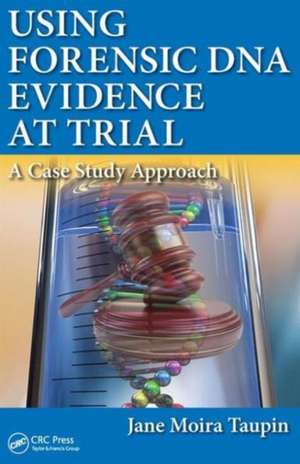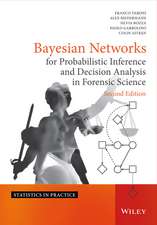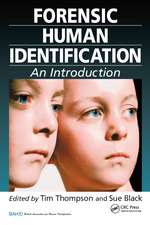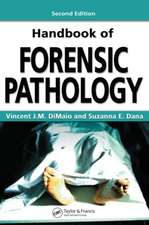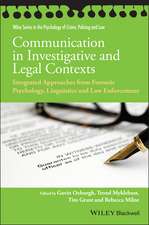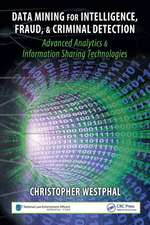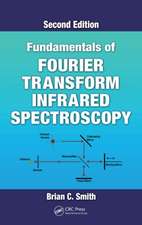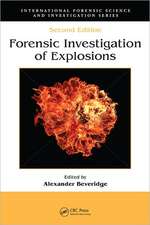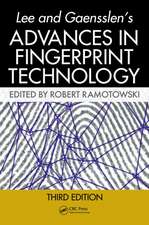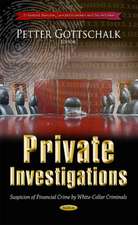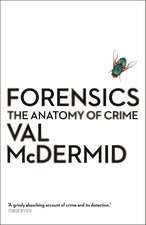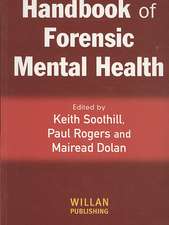Using Forensic DNA Evidence at Trial: A Case Study Approach
Autor Jane Moira Taupinen Limba Engleză Paperback – 25 feb 2016
With forensic DNA analysis becoming increasingly important at trial, the lively and sometimes bizarre cases presented in this book have been carefully chosen to highlight specific concepts, methods, and interpretations used in DNA analysis. Sections throughout examine the nature of expertise with a special focus on the role of subjectivity in the interpretation of forensic DNA evidence, emphasizing cognitive bias and extraneous context. Using both convictions and exonerations as examples, the book also discusses the strengths and limitations of DNA evidence and testing.
The book is written in an accessible manner for the non-scientific reader, such that criminal lawyers, judges, and forensic experts will all understand the nature of analysis and application of DNA evidence in a variety of court cases. Extensive references—including notable trial proceedings, cross references of cases, and specific forensic statistics—round out the book and help to provide a complete understanding of forensic DNA analysis and its current usage in the courtroom.
Preț: 327.38 lei
Preț vechi: 423.02 lei
-23% Nou
Puncte Express: 491
Preț estimativ în valută:
62.65€ • 65.54$ • 52.04£
62.65€ • 65.54$ • 52.04£
Carte tipărită la comandă
Livrare economică 03-17 aprilie
Preluare comenzi: 021 569.72.76
Specificații
ISBN-13: 9781482255812
ISBN-10: 1482255812
Pagini: 216
Ilustrații: 11
Dimensiuni: 156 x 234 x 13 mm
Greutate: 0.32 kg
Ediția:1
Editura: Taylor & Francis
Colecția CRC Press
Locul publicării:Oxford, United Kingdom
ISBN-10: 1482255812
Pagini: 216
Ilustrații: 11
Dimensiuni: 156 x 234 x 13 mm
Greutate: 0.32 kg
Ediția:1
Editura: Taylor & Francis
Colecția CRC Press
Locul publicării:Oxford, United Kingdom
Public țintă
Academic and Professional Practice & DevelopmentNotă biografică
Jane Moira Taupin is an independent forensic science consultant and trainer. She earned her MA in criminology from the University of Melbourne, Parkville, Victoria, Australia. Her thesis on the impact of DNA profiling was one of the first in the field. She has presented biological expert evidence in courts of law and DNA profiling evidence in court. She has published many articles in peer-reviewed journals on trace evidence, clothing damage and blood pattern analysis. She has also coauthored a text on the forensic examination of clothing and is the author of another on DNA profiling in criminal cases for the legal and forensic communities. She has received several awards in recognition and support of her work from national and international sources.
Cuprins
History of DNA Profiling Evidence in the Judicial System. Context. Transfer. Interpretation of DNA Profiles. Statistics. Low Template, Low Level or Low Copy Number DNA. Y-STR Profiling and Mitochondrial DNA Typing. Frontiers. Quality.
Descriere
With forensic DNA analysis becoming increasingly important at trial, this book presents carefully chosen cases that illustrate specific concepts, methods, and interpretations used in DNA analysis. It covers methods such as STR techniques, mitochondrial DNA, and Y-STRs as well as some novel techniques recently introduced in unique cases, including familial testing and analyzing domestic animal hair. It also addresses the strengths and limitations of forensic DNA evidence and highlights the nature of expertise of forensic professionals with a special focus on the role of subjectivity in interpreting forensic DNA evidence, emphasizing cognitive bias and extraneous context.
